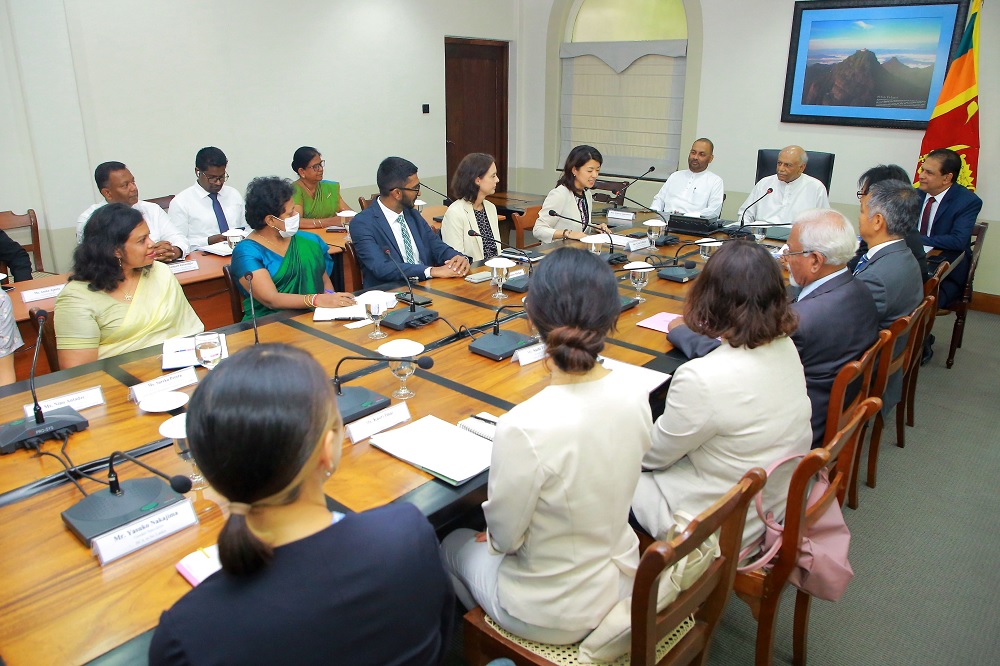 Japan is working with the United Nations Development Programme (UNDP) to help empower women in Sri Lanka.
Japan is working with the United Nations Development Programme (UNDP) to help empower women in Sri Lanka.
Prime Minister Dinesh Gunawardena, the Ambassador of Japan to Sri Lanka Mizukoshi Hideak and Ms. Azusa Kubota, Resident Representative, UNDP Sri Lanka, launched 2 new livelihood projects that address the economic crisis in Sri Lanka.
The ongoing socio-economic crisis has had serious impacts on the agricultural sector in Sri Lanka.
The rising energy costs and evolving climate change impacts have further exacerbated due to the situation. In response, the Government of Japan through the United Nations Development Programme (UNDP) in Sri Lanka, will provide approximately LKR 1,175 million (approx. USD 3.8 million) to support vulnerable smallholder farming families in the Dry Zone districts, namely North-Central, North-Western and Eastern Provinces, with a focus on women’s economic empowerment and adoption of green agricultural technologies.
Funded by the Japanese Supplementary Budget (JSB) and working together with the Government of Sri Lanka and relevant stakeholders, the intervention aims to achieve its objectives through two projects; the first focusing on diversifying livelihoods and introduce entrepreneurship programmes, targeting women-led MSMEs.
The second aims to strengthen energy and food security, through the revival of the rural agricultural economy by providing access to innovative markets, value and supply chain improvements along with the adoption of modern, green agricultural technologies which will increase productivity and efficiency.
A total of 58,000 women and youth will directly benefit from these projects, while indirectly impacting over 132,000 vulnerable community members from the North-Central, North-Western and Eastern Provinces of Sri Lanka.
To mark the beginning of these projects and to recognize the Government of Japan’s support to the interventions, a launch event was held today with the participation of Prime Minister Dinesh Gunawardena, Mizukoshi Hideaki, Ambassador of Japan to Sri Lanka, Ms. Azusa Kubota, Resident Representative, UNDP Sri Lanka, Tetsuya Yamada, Chief Representative of JICA in Sri Lanka, Mahinda Amaraweera, Minister of Agriculture, Wildlife and Forest Resources Conservation, Kanchana Wijesekera, Minister of Power and Energy, senior government officials and development partners.
Gracing the occasion, Prime Minister stated, “Government of Sri Lanka appreciates the continuous support extended by the Government of Japan and the United Nations Development Programme towards country’s efforts to recover from the socioeconomic crisis. We believe this is a significant step towards creating a food and energy secure Sri Lanka, both vital sectors to the fabric of the country’s economy.”
Highlighting Japan’s commitment to the people of Sri Lanka in crisis recovery efforts, Ambassador Mizukoshi, Ambassador of Japan to Sri Lanka stated, “Japan has been working together with the Government of Sri Lanka and relevant UN agencies for economic and social empowerment of women in Sri Lanka, including the formulation of National Action Plan for Women, Peace and Security. These new projects will provide for practical means to uplift lives of vulnerable communities. Especially, we recognize the special needs of women-headed household in conflict-affected areas. It is a great opportunity to create positive synergy with UNDP’s expertise and JICA’s technical assistance for supporting livelihood and vulnerable communities.”
Commenting on the role of UNDP in bringing together stakeholders and facilitating such processes in times of need, Ms. Azusa Kubota, Resident Representative, UNDP in Sri Lanka stated, “these are times when multiple-solutions through multiple-partnerships are required because we are faced with compounding and complex challenges. I am grateful for the commitments demonstrated by a wide range of actors present today. We must join hands to address the needs of the most vulnerable and affected segments of the society – particularly women-headed households. And investing in them will have visible, long-term benefits for the families and communities”. (Colombo Gazette)


Post a Comment